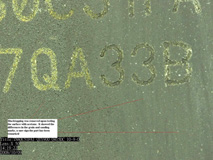U.S. Department of Justice
Ronald C. Machen Jr.
United States Attorney for the
District of Columbia
Judiciary Center
555 Fourth St. N.W.
Washington, D.C. 20530
PRESS RELEASE
FOR IMMEDIATE RELEASE For Information Contact:
Tuesday, September 14, 2010 Public Affairs
(202) 514-6933
http://www.usdoj.gov/usao/dc/Press_Releases/index.html
Owner and Employee of Florida-based Company
Indicted in Connection With Sales of Counterfeit High Tech Devices
Destined to the U.S. Military and Other Industries
Counterfeit Integrated Circuits Sold to U.S. Navy and Defense Contractors
WASHINGTON - A 10-count indictment was unsealed today in U.S. District Court for the
District of Columbia charging Shannon L. Wren, 42, and Stephanie A. McCloskey, 38, with
conspiracy, trafficking in counterfeit goods, and mail fraud. The indictment alleges that Wren,
McCloskey and others imported counterfeit integrated circuits from China and Hong Kong and
sold them to the U.S. Navy, defense contractors and others, marketing some of these products as
“military-grade.”
The charges were announced by U.S. Attorney Ronald C. Machen Jr., John P. Torres,
Special Agent in Charge of U.S. Immigration and Customs Enforcement, Office of Homeland
Security Investigations (HSI) in Washington, D.C., and Sandy Macisaac, Special Agent in Charge
of the Washington, D.C. office of the Naval Criminal Investigative Service. Other agencies
assisting in the investigation include the U.S. Postal Inspection Service, the Internal Revenue
Service - Criminal Investigation, the Office of the Inspector General for the U.S. Department of
Transportation, and the Office of Inspector General for the U.S. General Services Administration.
Wren, of Treasure Island, Fla., and McCloskey, of Clearwater, Fla., were arrested today
in Florida on bench warrants issued by the U.S. District Court for the District of Columbia.
Government agents executed search warrants for two locations and 17 seizure warrants for certain
proceeds of criminal activity, including a Showhauler Motor home, a Ferrari Spider, a Bentley
Arnage, a Mercedes Benz, motorcycles, and funds in several bank accounts.
According to the indictment, Shannon L. Wren is the owner of VisionTech Components, a
business for which Stephanie A. McCloskey is in charge of administration and for which she was
Page -2-
a co-signatory on bank accounts owned by Wren. The indictment alleges that Wren, McCloskey,
and others ran an integrated circuits counterfeiting operation from the VisionTech Components
address at 5120 110th Avenue North, Clearwater, Florida. Companies related to VisionTech are
Infuture, Inc., Infuture Electronics, and Carz, Inc.
The defendants are alleged to have advertised name-brand, trademark-protected Integrated
Circuits (“ICs”) for sale on a website, www.visiontechcomponents.com after acquiring ICs
bearing counterfeit markings from China and Hong Kong and importing them into the United
States through various ports of entry.
“Product counterfeiting, particularly of the sophisticated kind of equipment used by our
armed forces, puts lives and property at risk,” said U.S. Attorney Machen. “This case shows our
determination to work in coordination with our law enforcement partners and the private sector to
aggressively prosecute those who traffic in counterfeit parts.”
An integrated circuit is a high-tech device that controls the flow of electricity. Such
devices are used in a variety of applications including consumer electronics, transportation,
medical, spacecraft, and military. Counterfeit integrated circuits can result in product or system
failure or malfunction, and can result in costly system repairs, property damage, and serious
bodily injury, including death. Such counterfeits also raise national security concerns because the
history of the device is unknown, including who has handled it and what has been done to it. The
devices can also be altered and certain devices can be preprogrammed. Counterfeits can contain
malicious code or hidden “back doors” enabling systems disablement, communications
interception, and computer network intrusion.
According to the indictment, from about Jan. 1, 2007 through Dec. 31, 2009, Wren,
McCloskey and others generated approximately $15,868,009.62 in gross receipts through
VisionTech Components from the sales of counterfeit integrated circuits. Between Dec. 6, 2006
and Aug. 18, 2010, Wren, McCloskey and others imported from China and Hong Kong, on 31
separate occasions, approximately 59,540 integrated circuits bearing counterfeit marks, including
military-grade markings, valued at approximately $425,293. “Military-grade” integrated circuits
are sold at a higher price than those of commercial- or industrial-grade, because of the special
manufacturing techniques and additional testing required by legitimate manufacturers. Such
devices are tested to function at extreme temperatures (hot and cold) and/or withstand extreme
vibration.
Also, according to the indictment, there were numerous customer complaints regarding the
counterfeit integrated circuits sold by VisionTech, the defendants and others, including the
following:
- An August 2007 sale of 75 counterfeit National Semiconductor Corporation ICs to a
company in California that was fulfilling a joint contract with BAE Systems Technology
Solutions & Services and the Naval Air Warfare Center Aircraft Division (“NAWCAD”),
Page -3-
Detection and Surveillance Branch, Integrated Logistics Engineering. The ICs were intended to
be used for production of ship-based antenna equipment, the Identification Friend Foe (“IFF”)
system, which is used to determine an airplane’s identification and intentions while in flight.
- An April 2008 sale of 1,500 counterfeit Intel ICs to a company in California. The ICs
were in fulfillment of a purchase by Raytheon Missile Systems to support production and repairs
of A9 (missile) circuit card assemblies (“CCAs”) for a classified application.
- A January 2009 sale in which the defendants and others engaged in “bait-and-switch”
fraud with a company in New York, involving 2,000 (13 authentic and 1,987 counterfeit)
Motorola ICs. The devices were for fulfillment of a contract with Alstom, for an application in
the controllers in high-speed trains. According to the indictment, Wren was advised by a
representative of the buyer that the devices being ordered would be used in a “life critical
application.” Thereafter, the defendants and others sent the buyer 13 devices that were in
conformance with expected product specifications. But on Jan. 16, 2009, the defendants and
others sent the New York company 1,987 counterfeit devices.
- A June 2009 sale of one Texas Instruments, military-grade counterfeit device to MVP
Micro, Inc. According to the search warrant affidavit in connection with the VisionTech business
location, which was also unsealed today, MVP sold that device to a government undercover agent
as part of a criminal investigation of MVP Micro. Last year, Mustafa Abdul Aljaff, the owner of
MVP Micro, and Neil Felahy, the operations manager, pleaded guilty to charges in connection
with the sale of that device and other counterfeiting activity. Aljaff and Felahy are cooperating
with law enforcement authorities.
- A December 2009 sale of 350 counterfeit Cypress Semiconductor ICs to a company in
New York in fulfilment of a contract with Northrup Grumman for integration into a beam steering
control module board within the multiple sub-array of the testable antenna for the U.S. Navy
Cobra Replacement Program (ballistic missile defense).
The indictment does not suggest that any of the counterfeit ICs forming the basis of
customer complaints actually made their way into weapons systems.
As alleged in the indictment, there were also two undercover buys of counterfeit ICs from
VisionTech Components, one in June 2009 and one in July 2010. The defendants and others are
alleged to have sent Certificates of Conformance in connection with those sales, which certified
that all items in the shipment were inspected and conformed with specifications and requirements.
The conspiracy charge carries a potential statutory penalty of up to five years of
incarceration, a fine of $250,000, a three-year term of supervised release, and an order of
restitution. Trafficking in counterfeit goods carries a potential statutory penalty of up to 10 years
incarceration, a fine of $2 million, a three-year term of supervised release, an order of restitution,
and an order of forfeiture and destruction for articles bearing or consisting of counterfeit marks
and for any property used to commit or facilitate the commission of the offense. Mail fraud
Page -4-
carries a potential statutory penalty of up to 20 years incarceration, a fine of $250,000, a five-year
term of supervised release, and an order of restitution.
The indictment also includes a forfeiture allegation for approximately $16 million, which
constitutes proceeds of the crimes.
The case is being prosecuted by Assistant U.S. Attorney Sherri L. Schornstein. Assistant
U.S. Attorney Diane Lucas is working on the forfeiture component of the case.
Today’s charges reflect the importance of a larger effort led by the Department of Justice
Task Force on Intellectual Property (IP Task Force). Attorney General Eric Holder created the IP
Task Force to combat the growing number of domestic and international intellectual property
crimes, protect the health and safety of American consumers, and safeguard the nation’s economic
security against those who seek to profit illegally from American creativity, innovation and hard
work. The IP Task Force seeks to strengthen intellectual property rights protection through
heightened criminal and civil enforcement, greater coordination among federal, state and local law
enforcement partners, and increased focus on international enforcement efforts, including
reinforcing relationships with key foreign partners and U.S. industry leaders. To learn more about
the IP Task Force, go to http://www.justice.gov/dag/iptaskforce/
The public is reminded that an indictment is merely a formal charge that a defendant has
committed a violation of criminal laws and every defendant is presumed innocent until, and
unless, proven guilty.
Subscribe to:
Post Comments (Atom)






No comments:
Post a Comment